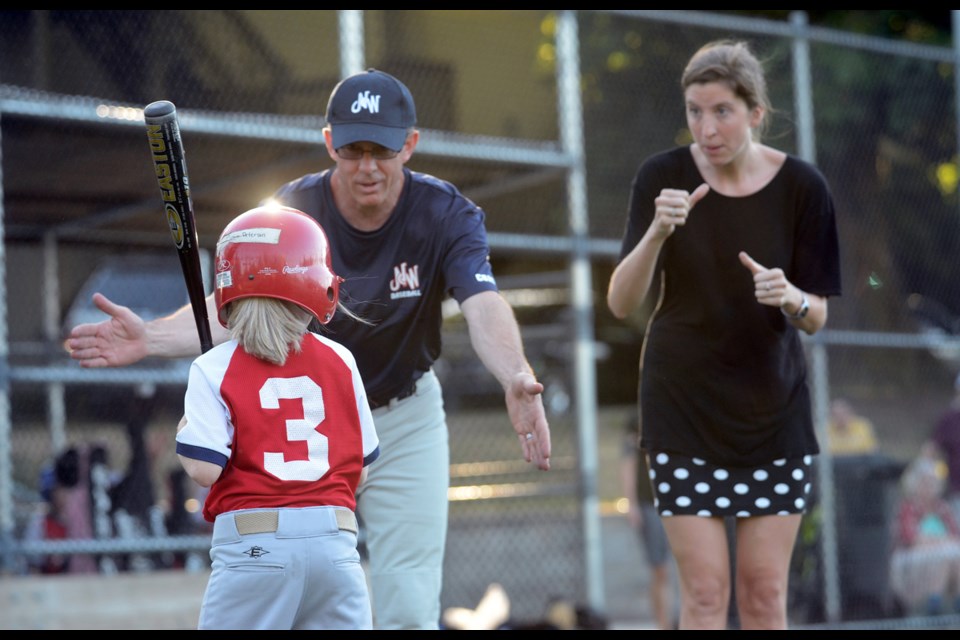When seven-year-old Ciara Peterson played T-ball in Coquitlam last year, she didn’t hear the shouts of encouragement from spectators and coaches that her teammates did.
She didn’t get all the coaching either.
The only deaf player on a hearing team, Ciara felt isolated, her mom Jascine told the Record.
And Ciara wasn’t the only one.
Seven-year-old Aiden Coyle, playing T-ball across the border in New Westminster, felt isolated too, according to his mom, Sarah.
“It was tough,” she said, “because I noticed that he knew all the names of the kids on his team, but none of the kids knew who he was, other than, you know, the deaf kid.”
Fast-forward one year, and that’s all changed – thanks to one willing coach and a new grant for sign-language interpreters for deaf athletes.
Ciara and Aiden, along with eight-year-old Teanna Santos, who is also deaf, recently wrapped up a season with New Westminster’s Red Cardinals rookie team.
Their final game at Queen’s Park last month was a testament to the transformation of their baseball experience.
There was plenty of enthusiastic yelling from the sidelines but also lots of “deaf clapping” – an applause alternative that looks a lot like jazz hands.
On the field and in the dugout, interpreter Brynn McIntosh moved unobtrusively among the players, acting as the deaf players’ communication link with coaches, teammates and anyone else who doesn’t know American Sign Language.
And, of course, there was the camaraderie between the deaf players.
“I like it when they’re with me because they’re my best friends,” Aiden said.
The Red Cardinals final game also drew a lot of support from the Lower Mainland deaf community, including former players on the Deaf White Sox, an all-deaf Little League team that formed for a couple years in White Rock in the early 2000s.
“Looking back now, it was such a great experience,” former player Cole Sanderson said through an interpreter. “I’m really excited that now we’ve got three other deaf kids on a team having the same kind of experience. I really hope that we keep it going next year and that it gets bigger and grows.”
It will keep going if coach Ian Williams has his way.
All 11 kids have been invited back to play for him again next season.
“It’s been fantastic,” he said, “best year yet.”
Coaching deaf players has come with a learning curve and a few logistical challenges for Williams, who has coached for eight years and played for 30, but it’s not just deaf players who’ve benefited, he said.
“It was a good effect on the other kids too,” he said. “It’s all about inclusion. It’s good experience for them for eight or nine weeks that they see that there are people with some challenges and how hard they fight through them.”
Besides learning a few basic signs and generally gesturing more for the deaf players, Williams said he has also learned some things that will help him coach all young players better.
“Eye contact is huge with this,” he said as an example. “It’s really good. I can tell if they’re confused or not.”
Aiden’s mom Sarah, meanwhile, said she can’t say enough positive things about Williams, who first coached her son in T-ball last year.
“He was incredibly accommodating,” she said. “I think sometimes, with deaf kids, if you don’t know how to communicate with them, then you just kind of get scared. This coach doesn’t have that fear, was not scared at all.”
So when the three sets of parents, whose kids all attend the B.C. Provincial School for the Deaf in Burnaby, decided to get their kids all on one team and were assigned Williams as their coach, they were thrilled.
The last piece of the puzzle was an interpreter.
That part fell into place thanks to a new grant from the B.C. Deaf Sports Federation, funded through a Ministry of Community, Sport and Cultural Development community gaming grant.
On Mondays, Wednesdays and Sundays during the eight-week season, McIntosh was the conduit of communication between the deaf players, coaches and teammates.
“Initially, at the beginning of the season, there was a little bit of awkwardness,” Sarah said. “Now it’s like nobody even notices.”
For Ciara’s mom, Jascine, who is also deaf and spoke to the Record through an interpreter, the whole thing has meant being able to step back and just watch her daughter enjoy the game.
“She can communicate with her teammates,” Jascine said. “She can understand the game better; she understands the coach. With that open communication, I think she’s had a lot more interest in the sport. She can see the interpreters and everybody cheering her on.”



